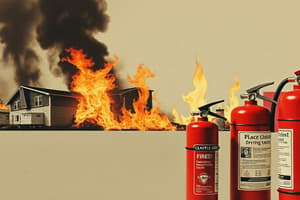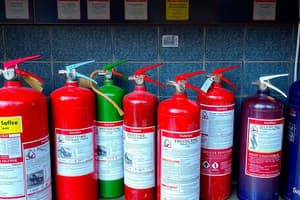Podcast
Questions and Answers
What are the three components that make fire?
What are the three components that make fire?
Heat, fuel, and oxygen.
What class of fire has flammable liquids as fuel?
What class of fire has flammable liquids as fuel?
Class B.
What does a class C fire involve?
What does a class C fire involve?
Energized electrical equipment.
What type of fire involves ordinary combustible materials such as paper and wood?
What type of fire involves ordinary combustible materials such as paper and wood?
How are fire extinguishers labeled to indicate what type of fire they are appropriate for?
How are fire extinguishers labeled to indicate what type of fire they are appropriate for?
What indicates that a fire extinguisher is NOT appropriate for a specific class of fire?
What indicates that a fire extinguisher is NOT appropriate for a specific class of fire?
Which types of fire extinguishers are appropriate for use aboard aircraft?
Which types of fire extinguishers are appropriate for use aboard aircraft?
Halogenated Agent extinguishers are considered to be more effective and have a greater range than Carbon Dioxide extinguishers.
Halogenated Agent extinguishers are considered to be more effective and have a greater range than Carbon Dioxide extinguishers.
Which type of extinguisher should ONLY be used on Class D fires?
Which type of extinguisher should ONLY be used on Class D fires?
Where would you find the record of the last visual inspection conducted on a fire extinguisher?
Where would you find the record of the last visual inspection conducted on a fire extinguisher?
How often is hydrostatic testing required for Halon extinguishers?
How often is hydrostatic testing required for Halon extinguishers?
When should a rechargeable fire extinguisher be recharged?
When should a rechargeable fire extinguisher be recharged?
For a typical workplace, what should be the maximum travel distance to a Class A or D fire extinguisher?
For a typical workplace, what should be the maximum travel distance to a Class A or D fire extinguisher?
What is the minimum number of fire extinguishers that all aircraft are required to carry?
What is the minimum number of fire extinguishers that all aircraft are required to carry?
How often should the fire extinguisher aboard aircraft be checked?
How often should the fire extinguisher aboard aircraft be checked?
For aircraft with interior access to the cargo compartment, where should the fire extinguisher be located?
For aircraft with interior access to the cargo compartment, where should the fire extinguisher be located?
What does the P in P.A.S.S. stand for?
What does the P in P.A.S.S. stand for?
What does the A in P.A.S.S stand for?
What does the A in P.A.S.S stand for?
If you encountered a fire in your hangar, when should you NOT try to fight the fire?
If you encountered a fire in your hangar, when should you NOT try to fight the fire?
Should an inflight fire occur, what is the first step the pilot(s) should take?
Should an inflight fire occur, what is the first step the pilot(s) should take?
During a flight, you smell smoke and fumes but do not see an obvious fire. How should you locate the hidden fire?
During a flight, you smell smoke and fumes but do not see an obvious fire. How should you locate the hidden fire?
The biggest hazard caused by a fire is the fire itself.
The biggest hazard caused by a fire is the fire itself.
Why are vapors considered dangerous during a fire?
Why are vapors considered dangerous during a fire?
Impaired judgment occurs when oxygen drops to what percentage?
Impaired judgment occurs when oxygen drops to what percentage?
What is the most common cause of fire on an aircraft?
What is the most common cause of fire on an aircraft?
When discharging a Halon fire extinguisher on an unpressurized aircraft, how low should the aircraft descend?
When discharging a Halon fire extinguisher on an unpressurized aircraft, how low should the aircraft descend?
What is the term for the overheating of a lithium-ion battery causing flames and smoke?
What is the term for the overheating of a lithium-ion battery causing flames and smoke?
In the recommended procedure to put out a lithium battery fire, what should be done after extinguishing the fire?
In the recommended procedure to put out a lithium battery fire, what should be done after extinguishing the fire?
Flashcards are hidden until you start studying
Study Notes
Components of Fire
- Fire requires three essential components: heat, fuel, and oxygen, in addition to a chain reaction.
Classes of Fire
- Fires are categorized based on fuel types:
- Class A: Ordinary combustibles like paper and wood.
- Class B: Flammable liquids.
- Class C: Involves energized electrical equipment.
- Class D: Typically involves combustible metals.
Fire Extinguishers: Labeling and Use
- Fire extinguishers are labeled with pictograms and class designations to indicate appropriate fire types.
- Pictograms with a black background and a red slash denote inappropriateness for certain fire classes.
- Water and halogenated extinguishing agents are suitable for aircraft.
Halogenated Agents vs Carbon Dioxide
- Halogenated Agent extinguishers are more effective with a greater range than Carbon Dioxide ones, and they leave no residue, making them suitable for low temperatures.
Fire Extinguisher Maintenance
- Dry powder extinguishers are specifically designed for Class D fires.
- Visual inspection records of fire extinguishers are found on the inspection tag log.
- Hydrostatic testing for Halon extinguishers is required every 12 years.
- Recharge extinguishers post-use or when needed.
Accessibility and Regulations for Aircraft
- In a typical workplace, travel distance to a Class A or D extinguisher should not exceed 75 feet.
- All aircraft must carry at least one fire extinguisher within the flight deck.
- Fire extinguishers aboard aircraft should be checked during each preflight inspection, ensuring they're secured and ready.
Fire Response Protocols
- Fire extinguishers should aim at the fire's base where the fuel burns.
- If faced with a hangar fire, avoid attempting to extinguish it under certain unsafe conditions.
- In the event of an inflight fire, pilots should immediately don protective gear.
Hidden Fires and Risks
- To locate hidden fires during flight, feel for heat behind walls and doors.
- Most fatalities from fire are due to smoke inhalation rather than burns; hence, smoke poses significant danger.
- Fire vapors may be toxic or poisonous when inhaled or absorbed.
Implications of Low Oxygen Levels
- Oxygen levels dropping to 17% can impair judgement in emergency situations.
Causes of Aircraft Fires
- The leading cause of fires on aircraft is electrical wiring and component failures.
Special Cases: Lithium Ion Battery Fires
- Overheating of lithium-ion batteries may lead to thermal runaway, producing flames and heavy smoke.
- After extinguishing a lithium battery fire, cool down the device and allow it to rest for 15 minutes to prevent re-ignition.
Descent Recommendations
- To increase oxygen concentration during a fire aboard an unpressurized aircraft, descend to 8,000 feet or as low as practical.
Studying That Suits You
Use AI to generate personalized quizzes and flashcards to suit your learning preferences.




